LITERATURE:
Production systems management
 Book is the result of a research work carried out within the framework of the Laboratory for production and operations management and provides a comprehensive understanding of the operation of the production system and the strategic role of production in achieving the competitive advantages of an industrial enterprise. It is intended for both practitioners as well as undergraduate and postgraduate students. The first chapter provides a thorough reflection on the composition, the need and the role of production systems in the business process of the company, followed by a chapter on production strategies supported by the theory of production sources. The field of modelling of business processes and possibilities for their renovation is also discussed. The section on industrial clusters discusses the possibilities that the concept offers to enhance the competitive advantages of businesses and entire regions. Following are the chapters on product development and their introduction on the market, dynamic production management on order, optimization and control of production processes, all finished with a chapter that deals with the overall quality control of products.
Book is the result of a research work carried out within the framework of the Laboratory for production and operations management and provides a comprehensive understanding of the operation of the production system and the strategic role of production in achieving the competitive advantages of an industrial enterprise. It is intended for both practitioners as well as undergraduate and postgraduate students. The first chapter provides a thorough reflection on the composition, the need and the role of production systems in the business process of the company, followed by a chapter on production strategies supported by the theory of production sources. The field of modelling of business processes and possibilities for their renovation is also discussed. The section on industrial clusters discusses the possibilities that the concept offers to enhance the competitive advantages of businesses and entire regions. Following are the chapters on product development and their introduction on the market, dynamic production management on order, optimization and control of production processes, all finished with a chapter that deals with the overall quality control of products.
Production management
 Book is the result of many years of research, pedagogical and practical work in the field of production management. It is intended for students of technical professions and practitioners - managers in enterprises (with production and / or service activity). Initially, the basics of production management with production function, product strategy and product design are presented. The following five basic chapters of production management are discussed: process design, scheduling of terms and capacities, quality management, inventory management and work management. Presented theoretical bases are supported by practical examples. The contents of the book conclude the chapter on the globalization of production and the English-Slovenian glossary in the field of production management.
Book is the result of many years of research, pedagogical and practical work in the field of production management. It is intended for students of technical professions and practitioners - managers in enterprises (with production and / or service activity). Initially, the basics of production management with production function, product strategy and product design are presented. The following five basic chapters of production management are discussed: process design, scheduling of terms and capacities, quality management, inventory management and work management. Presented theoretical bases are supported by practical examples. The contents of the book conclude the chapter on the globalization of production and the English-Slovenian glossary in the field of production management.
English-Slovenian dictionary of terms in the field of production engineering and management
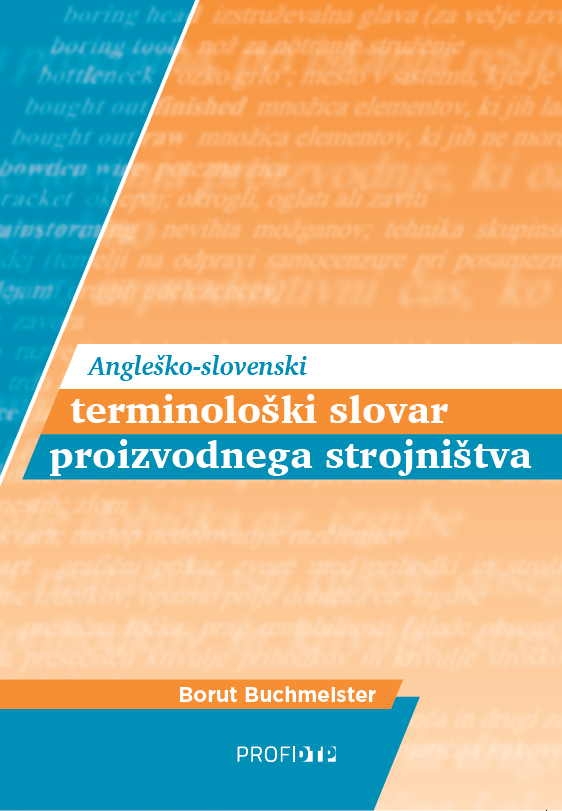
The creation of the dictionary is the result of fifteen years of research and engaging in production engineering and production management, continuous encounter with foreign literature, and author's notes on English concepts. The dictionary is intended primarily for students to perform study obligations and writing diploma theses and researchers in everyday work, studying and translating foreign literature.
Knowledge management

Knowledge and knowledge management in the business world is an essential prerequisite for the competitiveness of companies. In the knowledge society, intellectual capital represents, besides the classical factors of production, such as machines, equipment, financial participation and possession of real estate, an integral part of the company. Knowledge management values the organizational processes in the company, people and technologies, and this information also includes partners and customers in the value chain, which directs them to acquire new knowledge and thus to increase their business success. Management of knowledge and use of this means the survival of companies in the future, so the manual is intended not only for production but also for other companies that want to be successful on the market. In the second part of the manual, theoretical findings are supported by concrete methods that have already been implemented in practice.
.
Research methodologies in operational management

This work is intended for researchers with engineering education, who encounter their organizational issues in their scientific and research work. Knowledge can by nature be similar to counselling tools and have practical value, but their scientific value is questionable due to the disconnection between theory and experience. This link is established using appropriate methodologies. The issues discussed in the section are also relevant to other management researchers.
Ergonomics
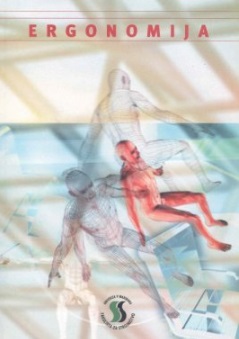 Twenty years of joint work by the authors of the book led to the recognition that the Slovenian professional public must also get work that will combine knowledge from the world treasury of knowledge. Therefore, the book is designed to firstly systematically present the necessary knowledge to solve ergonomic problems, such as: human organism with anatomical and physiological basics, the psychological basis of ergonomics, the burden and the burden of man in the work system, workload burdens, systemic ergonomics, the design of work and ergonomic tests with assessment procedures, with added examples of practical work added.
Twenty years of joint work by the authors of the book led to the recognition that the Slovenian professional public must also get work that will combine knowledge from the world treasury of knowledge. Therefore, the book is designed to firstly systematically present the necessary knowledge to solve ergonomic problems, such as: human organism with anatomical and physiological basics, the psychological basis of ergonomics, the burden and the burden of man in the work system, workload burdens, systemic ergonomics, the design of work and ergonomic tests with assessment procedures, with added examples of practical work added.
Overview of tests and methods in ergonomics
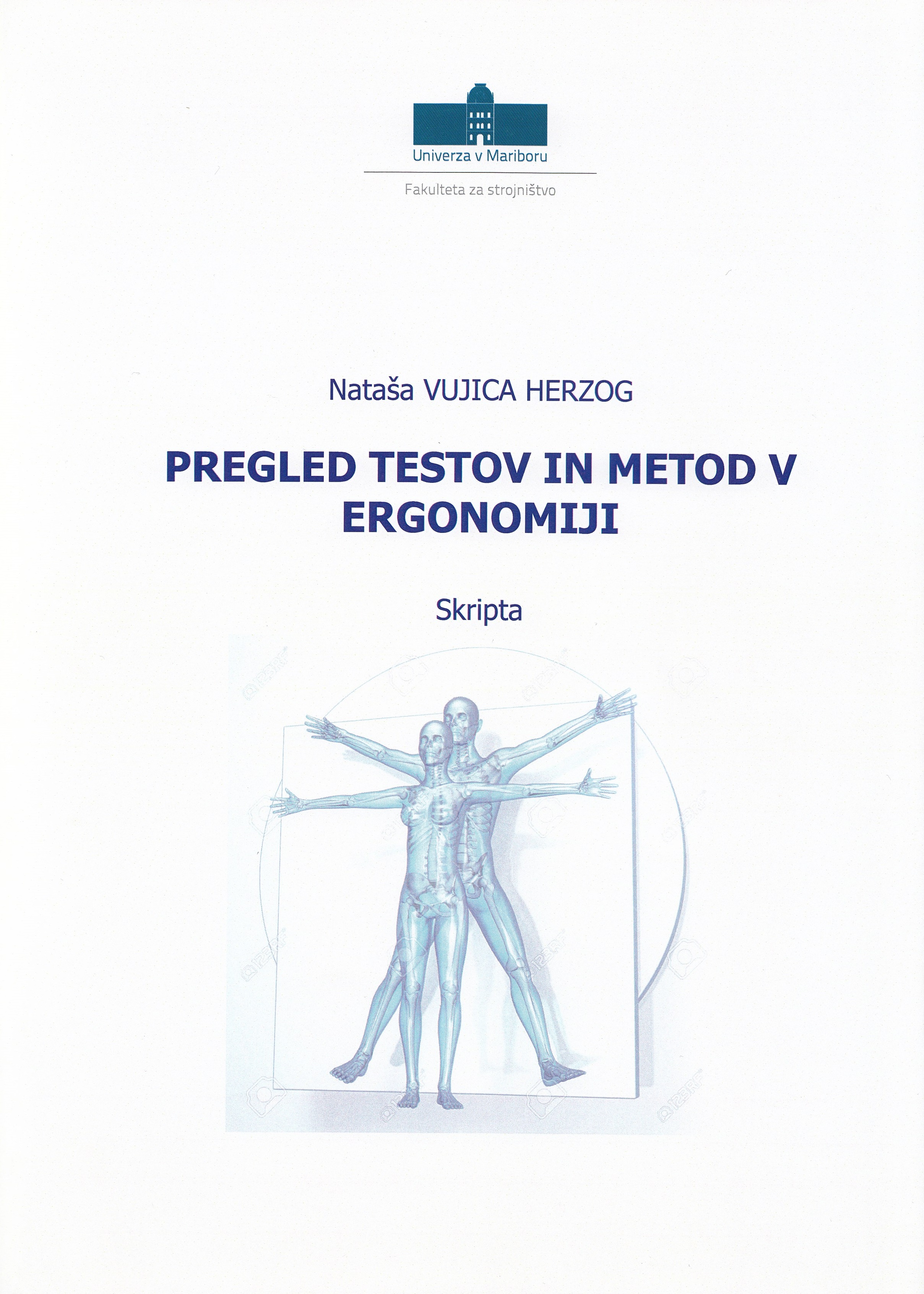 This book is aimed at enriching ergonomics literature with suggestions for using different approaches, tests and methods. In the book, the OWAS method presents other methods for the analysis and evaluation of bodily positions or the body of the worker at work, such as RULA, REBA, NIOSH, OCRA, LUBA, ERIN, SI, PEIL and others, which were specifically designed for different industrial environments. Examples of uses are also given for most methods. A new contribution to the study of job suitability is also computer simulation and analysis of jobs with the Jack software.
This book is aimed at enriching ergonomics literature with suggestions for using different approaches, tests and methods. In the book, the OWAS method presents other methods for the analysis and evaluation of bodily positions or the body of the worker at work, such as RULA, REBA, NIOSH, OCRA, LUBA, ERIN, SI, PEIL and others, which were specifically designed for different industrial environments. Examples of uses are also given for most methods. A new contribution to the study of job suitability is also computer simulation and analysis of jobs with the Jack software.
Work and jobs design

Book provides answers to job creation and job creation. The necessary basics of ergonomics and design of work and workplaces, all the burdens that can occur at the workplace, types, methods and techniques of job creation and workplaces are needed, additional time is needed for the execution of work and computer-aided design of work and jobs.
Work and jobs design in practice
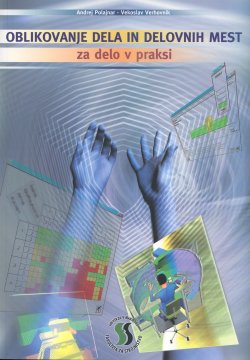
Book provides guidance on the design of work and jobs. Initially, the necessary skills for job creation are presented: the dimensions of workplace equipment, anthropometry, attitudes at work, assessment workplace analysis, thermal environment, visual and audible detection functions, ergonomic coefficient and breaks, followed by several examples of job creation in an apparel company.
Work study
 The book is the result of years of work in the field of study work and multiple editions of scripts in this field. It is intended for students of technical professions and practitioners in this field. Firstly, the basic concepts in the field of study of work are presented, as well as time-based management and study of work as part of the organization of production. The central chapter of the book deals with the issues of study and time analysis.
The book is the result of years of work in the field of study work and multiple editions of scripts in this field. It is intended for students of technical professions and practitioners in this field. Firstly, the basic concepts in the field of study of work are presented, as well as time-based management and study of work as part of the organization of production. The central chapter of the book deals with the issues of study and time analysis.
Work study in practice

The book presents the basic concepts of a study of work, where statistics are especially detailed, which monitors all calculations. Then, ways of setting norms are presented. A special chapter deals with the determination of losses and congestions in production that affect the time and costs of the company. Rationalization, which is necessarily related to time and costs, and ergonomics are also addressed. All chapters end with solved computational examples.
Production process preparation

Starting from the goals of preparation of production, the book describes the tasks from the fields of production planning, system design and production management. Solutions are presented on how preparation of production is integrated into a comprehensive business system with integration possibilities in the direction of construction, production and assembly. The book also contains no suggestions for raising the efficiency of the production system and modern development guidelines.
Production process preparation in practice

The designer of the production process has to use a lot of data for the calculation of time values in the processes, data on typical machines, data for calculating costs, methods for material stock management, production scheduling, plant control data and planning the necessary capacities of machines and people. The book also presents accessible software for work in the design and management of production processes.
Production process organization
 Book deals with the interdependence of the organization and the environment, which gets a new quality in modern living conditions. Growing production and consumption of goods alter the way of life, which is reflected in many disparities between production and consumption. These findings were the basis for a systematic approach to the treatment of organization of production in a book, which presents the following areas: planning the production system, designing the technological and production process, studying work and ergonomics, planning and managing production, quality control and assurance, material management and maintenance . For all the above chapters, computational examples are presented for theory.
Book deals with the interdependence of the organization and the environment, which gets a new quality in modern living conditions. Growing production and consumption of goods alter the way of life, which is reflected in many disparities between production and consumption. These findings were the basis for a systematic approach to the treatment of organization of production in a book, which presents the following areas: planning the production system, designing the technological and production process, studying work and ergonomics, planning and managing production, quality control and assurance, material management and maintenance . For all the above chapters, computational examples are presented for theory.
Transformation technologies
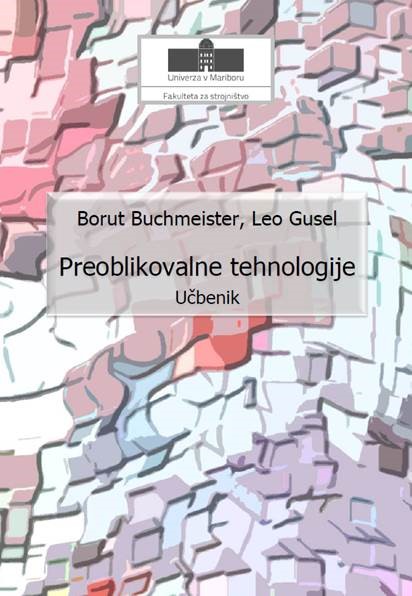 Increasing requirements for interdisciplinary knowledge of engineers, creativity and innovation include the knowledge of transformative technological processes. The key chapters in the book deal with the following topics: introduction to the basics of transformation technique, pressure processes, tensile-pressure processes, tensile processes, bending processes, shear processes, high speed processes, sintering, transformation of polymeric materials, computational examples. The book is designed with the aim of concentrating the necessary knowledge of transformation technique with emphasis on the essential characteristics in the selection of the appropriate technology.
Increasing requirements for interdisciplinary knowledge of engineers, creativity and innovation include the knowledge of transformative technological processes. The key chapters in the book deal with the following topics: introduction to the basics of transformation technique, pressure processes, tensile-pressure processes, tensile processes, bending processes, shear processes, high speed processes, sintering, transformation of polymeric materials, computational examples. The book is designed with the aim of concentrating the necessary knowledge of transformation technique with emphasis on the essential characteristics in the selection of the appropriate technology.



